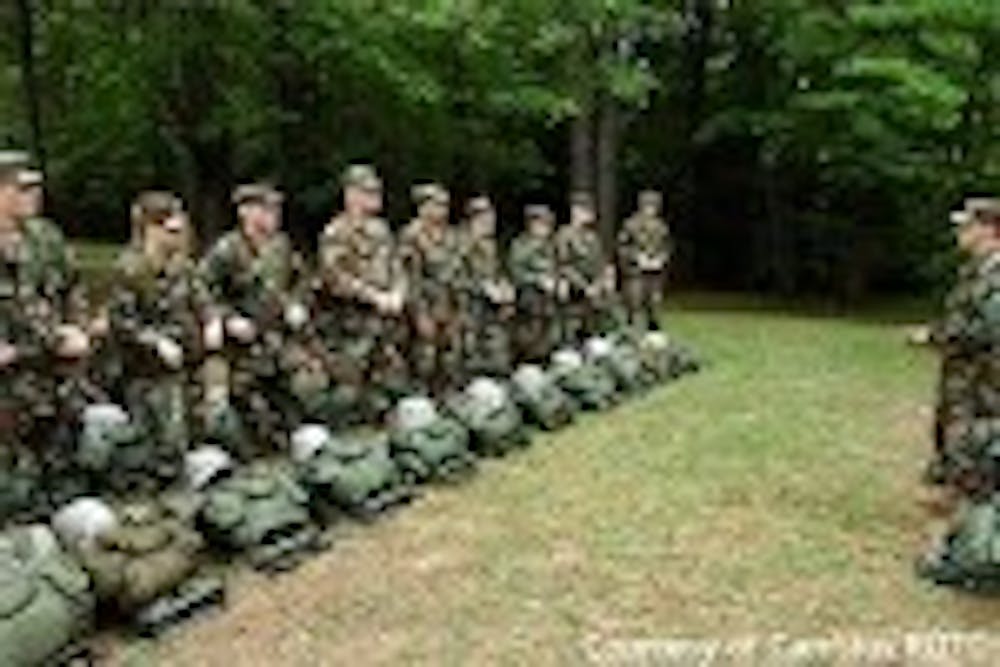At 6:15 a.m., while most students are sleeping soundly in their dorms, the boots of cadets in UB's Reserve Officer Training Corps (ROTC) program can be heard striking the broken pavement as they start their tri-weekly physical training.
Among the many values that cadets gain from training in the ROTC, the number one skill that they learn is leadership.
Jamie Hefter, a freshman nursing major and first year cadet in the ROTC, knew she wanted to help her country at a young age.
"After September 11th, I felt horrible about being so close and not being able to do anything to help. I was too young to do any clean-ups or go into the city and volunteer," Hefter said.
Living in Brooklyn, the Twin Towers fell close to Hefter's home. After her junior year in high school, Hefter contacted Captain Brian Hyer about joining the ROTC when she enrolled at UB for her undergraduate degree.
Like Hefte, Ben Fraser, a freshman nursing major and first-year cadet, wanted to join the ROTC since he was young. Influenced by his family's service background, Fraser has always wanted to help people and looks forward to serving his country after graduation.
"I've been around nurses and doctors all my life watching them help people because my brother has disabilities," Fraser said. "I've just always wanted to help people and serve our country."
According to Josh Walther, a senior history major and bravo cadet first sergeant,
the first step for students to join the ROTC is to contact Captain Hyer.
Students must then pass a physical training test. Men must complete 42 push-ups and 54 sit-ups in two minutes for each and run two miles in 15:54 minutes. Women must complete 17 push-ups and 54 sit-ups in two minutes and run two miles in 18:64 minutes.
For the first two years students can choose whether or not they're contracted. Cadets who are contracted are obligated to stay with the program for the entire four years that they're in college.
Walther advises that students who aren't sure whether the ROTC is right for them to stay un-contracted. That way, students can leave the program without consequence.
The cadets of UB's ROTC program, whose home base is at Canisius College, invest about four to five days a week toward their ROTC training.
Three times a week, cadets start their days with physical training at Alumni Arena and Canisius College. Cadets also take part in a lab practicals and military science classes where they are trained in leadership skills and military knowledge. Students obtain transfer credits for their work, Fraser explained.
On top of their weekly training, third and fourth year cadets participate in a monthly lab on Saturdays. Cadets learn and put battle and military tactics to use, Walther said. Fraser just participated in his first Saturday lab, which he found "exciting."
After their junior year, third year cadets are also required to participate in a 35-day junior officer training camp at Fort Washington over the summer. Cadets' skills as officers are tested and evaluated.
While the ROTC takes up much of the cadets' free time, they still find enough time in their schedules to keep up with their grades and have a little fun. On top of keeping up with their ROTC work, cadets are expected to maintain a 3.0 GPA and professional demeanor, exemplifying their leadership skills.
"It's not like we can't go out and have fun or do things that other college students do, but we just have to remember that we're representing the ROTC everywhere we go," Hefter said. "I don't think that I've missed out on anything by being in the program."
According to Hefter, being in the ROTC overall teaches cadets how be motivated leaders. Whether it's in the military or not, the ROTC teaches cadets how to react in any situation.
"The ROTC is a great support group. We're all so close and once you join you have an instant group of friends," Walther said. "ROTC offers a lot of opportunity not only to learn leadership skills and discipline, but to help pay for college and figure out what you want out of life."
Walther first thought about joining the ROTC when he was at freshman orientation looking for a way to pay for college. The ROTC offers many scholarships for contracted cadets. Sometimes, cadets can receive monthly stipends so they don't have to work while going to school and participating in the program.
After graduating from UB in May, Walther will be commissioned as a second lieutenant in the army reserve. That way he can continue his education and receive scholarship money for his schooling in management.
"After you graduate from college and from the ROTC, cadets choose their top three placements and then based upon their GPA and evaluation in ROTC they are placed accordingly," Walther said.
Walther believes that the ROTC offers students a chance to get to know themselves - all students need to have is interest in the program.
"There isn't a set personality that should join ROTC," Walther said. "Basically when you join you just have to have the drive and motivation to be there. You just have to really want it."





